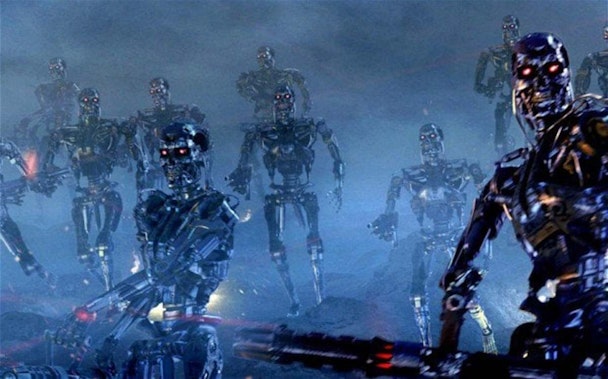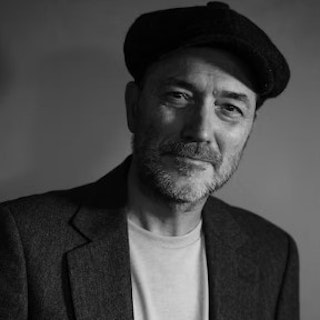The Hollywood writers and actors strike is ground zero for the coming AI battles
As editor-in-chief and co-founder of The Drum, Gordon Young, has been closely watching the rise of generative AI. Through the prism of the Hollywood writers and actors strike, he explores the potential of tech to radically transform media.

A screenshot from James Cameron's forward-looking The Terminator
The Hollywood writers and actors strike gives a fascinating insight into the shape of AI battles to come. The issues are complex - but, among other things, writers want studios to take AI out of their workflow, and actors want to prevent their likeness and voice from being used in future productions without their permission.
The strike really hit the headline when members of the SAG-AFTRA actors union walked out of premieres like Oppenheimer in solidarity with their peers. Down the line, there's going to be a shortage of content comparable to the late pandemic lag.
Many will have sympathy with the plight of the actors and writers. But I can’t help thinking of a quote by AI guru Max Tegmark where he said the response of many to the new tech is akin to the cast of ‘Don’t Look Up.’
They are obsessed with detail despite the fact that a giant meteorite is minutes away. It will change everything, completely, absolutely and totally. Are these strikes a case of fiddling while your world implodes?
Advertisement
There is no doubt new forms of distribution, and production as well as AI is changing the film model drastically.
For evidence of the scale of this disruption look no further than the Ryan Reynolds-backed MNTN. At Cannes Lions, I had a fascinating presentation from VIVA its new division that makes AI-generated TV commercials. It can create a 30-second video - with script, film, music and voiceovers - in 30 seconds. At the moment it is the equivalent of a Wright Brother piano wire plane making its first wobbly flight. But it will not be long before it’s a sleek model-busting airliner - the type that sunk trans-Atlantic ocean liners
That is why there must be an irony in the fact that Reynolds - net worth circa $150m - and a leading AI advocate is now on strike over AI. He walked off the set of Deadpool 3, a movie that will earn him over $20m.
Advertisement
He will no doubt argue that he is striking on behalf of the little guy - the extra who will have to sell his or her likeness for the price of a daily fee. It is true that actors and writers outside the big league have legitimate concerns. But to scholars of UK industrial relations, the strikes have a familiar ring. It is reminiscent of the newspaper disputes in the 80s, where unions such as the NGA and SOGAT battled against computerization and entered the Hall of Oblivion for their troubles.
Certainly, some talk in the industry does seem Luddite. For example, this is what filmmaker and writer Justine Bateman, told the BBC’s TechLife earlier this year: "Tech should solve a problem and there's no problem that those using AI solves. We don't have a lack of writers, we don't have a lack of actors, we don't have a lack of filmmakers - so we don't need AI.
Suggested newsletters for you
"The problem it solves is for the corporations that feel they don't have wide enough profit margins - because if you can eliminate the overhead of having to pay everyone you can appease Wall Street and have greater earnings reports.
"If AI use proliferates, the entertainment industry will crater the entire structure of this business."
The WGA - the writers union - agrees and they are demanding contracts from studios so AI can’t write or rewrite literary material; can’t be used as source material; and their members’ work can’t be used to train AI. Good luck with that. King Canute would be proud. But whether they like it or not, as sure as high tide follows low, AI is coming.
But that does not mean their fears aren’t rational and shared by many across every creative sector.
One person who has been looking at these issues is Craig Hepburn, head of digital at Uefa.
He told me: “The implications of what they are protesting for are far-reaching so I fully support it. Honestly, people need to wake up to what Generative AI is capable of today and where it’s headed. It scares the shit out of me. I’m also excited about it. People do need to make a stand even if to raise the profile of the implications of the tech.”
But he is also aware of the impact it will have in terms of jobs, “I honestly could replace 30% of staff in key roles today with what AI can do and it would improve output and quality. I haven’t as there are bigger implications. We need technology lawyers fighting to slow down the pace. It is inevitable but let’s try and manage it at a pace the world can adapt to.”
It’s a sensible take.
AI is coming to Hollywood and there is nothing the unions can do to stop it. However, if their action does raise awareness of the challenges we all face, and perhaps buys us time to adapt, then perhaps it is something we can all get behind.

